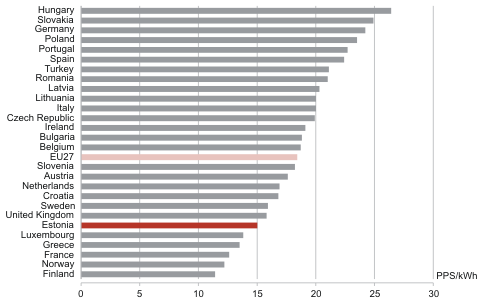Introduction of renewable sources of energy has significantly reduced the share of oil shale in electricity production
In 2011 compared to the previous year, the production of wind energy increased by nearly a third, the production of hydro energy over 10% and electricity from biomass over 5%. The share of electricity generated from renewable sources in the total electricity consumption increased from 11% to 13% during the year.
In 2011, the production of electricity totalled 12,893 GWh, which is 1% less than in the previous year. Compared to the last year the consumption of electricity decreased by 4.3% and totalled 7.1 TWh. Smaller electricity consumption and increased gross domestic product (GDP) has reduced the energy intensity over 7% compared to 2010.
Estonia continues to be a large-scale exporter of electricity, and in 2011 the production of electricity exceeded the consumption by 60%. In 2011 compared to 2010, exports of electricity increased over 20%. The growth of the exported electricity is influenced by the increase in the production of cheaper hydro energy in Nordic countries. The share of electricity exported to Latvia and Lithuania increased 30% as total.
In 2011, 18.7 million tons of oil shale was produced, which is 4% more compared to 2010. The growth was first and foremost caused by the increase in the production of shale oil. The demand for shale oil in Estonia and on external markets increased the production of shale oil about 7%. Three quarters of the production was exported and it increased nearly 13% compared to the previous year. More than a half (54%) of exported shale oil is exported to the Netherlands, followed by Russia (15%) and the United Kingdom (8%).
At the same time the production of other fuels decreased. Due to smaller external demand the production of peat, peat briquettes and wood pellets decreased nearly 10% compared to 2010. Exports of pellets decreased 7%.
The electricity price per kilowatt-hour for household end consumer was on average 0.1 euro as at end of 2011. Due to the increased cost of network service the price of electricity increased by 3.8% during the year. The price of electricity in Estonia is one of the lowest compared to the other European countries. The situation changes when the purchasing power standard (PPS) is taken into account. The electricity price in Estonia is still more expensive than in Luxembourg, France, Norway, Finland and Greece and slightly smaller than the United Kingdom and Sweden.
Electricity prices for household consumers based on purchasing power standard, 2011
